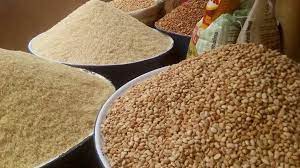
Though the Holy Book says, “Man shall not live by bread alone”, one thing most Nigerians think about these days is the prices of food items rising constantly.
For many who are pessimistic, times are hard and government policies have been very harsh, especially to the common man.
Inflation has hijacked the price of things so much that even sachet water is almost out of the reach of the poor.
Hence, the government has been advised to intervene and ensure that Nigerians get access to food at an affordable rate.

The Food Price Watch report of the National Bureau of Statistics (NBS) has shown that there is a rise in the cost of basic food items.
Essentials such as beef, rice, beans, onion, white garri, yam, bread, and more have seen steep price increases over the past year.
The released NBS report for February 2024, on selected food items indicates that the average price of 1kg of boneless beef surged by 49.41%.
Between February 2023 to February 2024, the price of boneless beef jumped from ₦2,445.96 to ₦3,654.56.
Have You Read: Lagos State: Mammoth Crowd As ‘Ounje Eko’ Discounted Food Markets Commence Sales
Similarly, the cost of 1kg of local rice skyrocketed by 134.81%, climbing from ₦520.84 to ₦1,222.97 in the same period.
Beans, onions, garri, yam, and the bread also followed this upward trend, with significant year-on-year price hikes recorded.
Detailing the monthly comparison, the NBS statement, signed by spokesperson Jonas Agwu, notes that “on a month-on-month basis, 1kg of boneless beef increased by 10.22% in February from the ₦3,315.78 recorded in January 2024”.
This reflects the continuous rise in food prices across the board.
Need For Policy Interventions
The significant increase in food prices has raised concerns among consumers and economists alike.
Many attribute the rise to factors such as inflation, supply chain disruptions, and changing market dynamics.
You May Also Like: See Full List Of Venues For Lagos Discounted Food Markets
The NBS has called for increased efforts to address the causes of food price inflation.
It emphasised the need for policy interventions to ensure the affordability and accessibility of essential food items for all Nigerians.